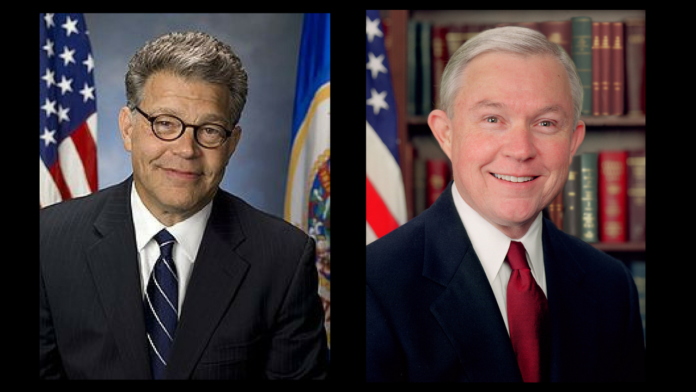Franken Uses Senate Confirmation Hearing to Attack Sessions on Civil Rights Record
Washington D.C. – Sen. Al Franken accused Attorney General-designate Sen. Jeff Sessions of lying about his civil rights record during his Senate confirmation hearing.
Sen. Sessions, President-elect Trump’s nomination for Attorney General, faced tough questions in his confirmation hearing on Tuesday. Sen. Franken used his opportunity to vet the candidate to accuse Sen. Sessions of stretching the truth on his civil rights record.
Franken brought up an interview from 2009 when Sessions became the top Republican on the Senate Judiciary Committee. In the media appearance, Sessions stated he had filed “20 to 30 civil rights cases.” Then in November, Sessions’ office stated he had prosecuted “a number” of desegregation cases. Franken was insistent that the numbers didn’t add up.
Sessions handled the accusations tactfully, explaining the exact number is likely different because of his varying level of involvement in each of the cases. But Franken wasn’t stopping there.
In a questionnaire Sessions submitted prior to the hearing, he was asked to list his ten most important cases that he personally litigated. Of the ten cases Sessions listed, four were civil rights cases, which Franken focused on.
Franken accused Sessions of misrepresenting his own record by exaggerating his involvement in these cases. Franken’s questioning was based on a recent Washington Post Op-Ed written by DOJ officials that worked on three of the four cases Sessions cited. In the op-ed, the attorneys claimed Sessions had “no substantive involvement” in each of their cases.
Sessions defended himself saying his support was far-reaching, even offering office space for some of the cases. He reminded the panel that one of the op-ed writers, Gary Hebert, is on record saying Sessions was more supportive than any other U.S. attorney.
Later in the hearing, Sen. Ted Cruz came to the defense of Sen. Sessions. Cruz pointed out that Sessions provided each of the cases as supplementary evidence with his questionnaire, and described in detail his role in each of the four cases in questioned.
Franken responded to Cruz, defending his questioning saying, “it is important in my view that the members of this committee get clarity with regard to the nominee’s record. That’s our job, and it’s important.”


















